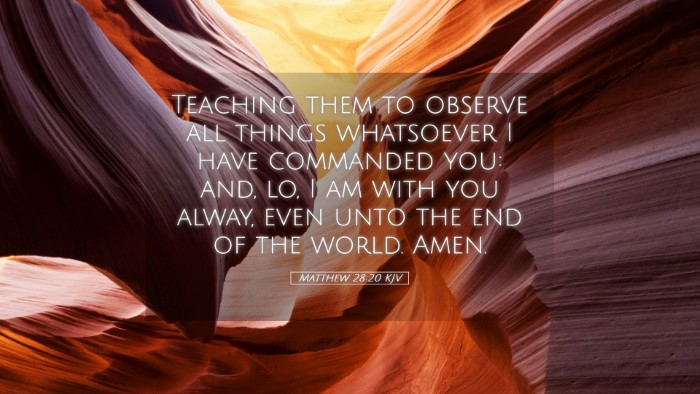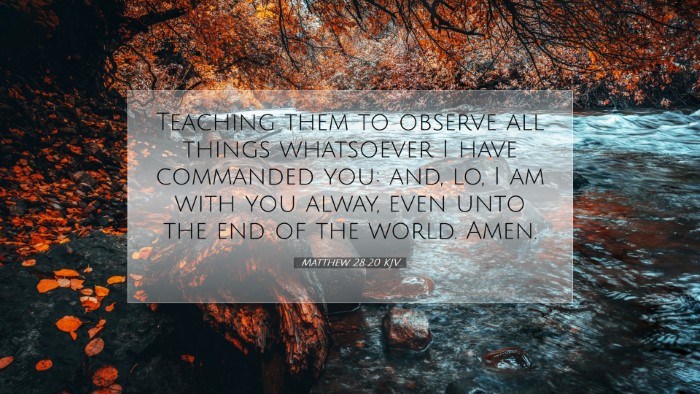Commentary on Matthew 28:20
Verse: "Teaching them to observe all things whatsoever I have commanded you: and, lo, I am with you alway, even unto the end of the world. Amen."
Introduction
This final command of Jesus, often referred to as the Great Commission, encapsulates the mission of the Church. The assurance of Christ's presence promises both comfort and motivation for believers. This commentary will draw insights from various public domain commentaries, including the works of Matthew Henry, Albert Barnes, and Adam Clarke, to provide a comprehensive understanding.
Exegesis of Matthew 28:20
This verse serves as both a command and a profound promise. The structure of the verse is pivotal in understanding its implications for the Church and individual believers.
Command to Teach
“Teaching them to observe all things whatsoever I have commanded you”
Here, the emphasis lies on the teaching ministry of the Church. Matthew Henry highlights the importance of teaching not merely as a transfer of information but as compliance with Christ’s directives. This teaching involves both doctrine and practice, signifying the necessity of grounding believers in the full scope of Jesus's teachings.
Scope of the Teaching
Albert Barnes elaborates that the phrase "all things" indicates that no command of Christ is to be overlooked. The ministry of the Church is holistic, addressing both moral and ethical teachings, which encompass the entirety of Christ’s message. This aligns with the call for believers to observe and adhere to these teachings rigorously.
The Promise of Christ's Presence
“...and, lo, I am with you alway...”
This promise is central to the believer's assurance as noted by Adam Clarke. He elucidates that the phrase “I am with you” affirms Christ's spiritual presence through the Holy Spirit, highlighting that He will never abandon His followers. This presence reaffirms the empowerment of believers in their mission, providing confidence and boldness in the face of resistance.
Implications of Christ's Presence
Matthew Henry insists that Christ’s continued presence serves as a source of strength and guidance for Christians, emphasizing the divine assistance available to them. The acknowledgment of Christ’s omnipresence not only ensures that believers are never alone in their efforts but also transforms the mundane tasks into sacred duties performed in the presence of the Lord.
The Everlasting Nature of the Promise
“...even unto the end of the world.”
The declaration of Christ's presence extending “even unto the end of the world” encapsulates a powerful eschatological promise. Albert Barnes points out that this phrase emphasizes that the Church’s mission will endure until Christ’s return. Consequently, the tasks of teaching and ministering are part of an ongoing process that holds eternal significance.
Encouragement for the Church
This enduring promise serves as a profound encouragement to the Church, particularly in moments of trial. Adam Clarke reflects on the historical context faced by early Christians, suggesting that they drew immense strength from knowing that Jesus remained with them despite persecution. This assurance is just as vital for contemporary believers as they engage in their faith amidst challenges.
The Significance for Pastors and Theologians
This passage carries weighty implications for leaders and scholars within the church. The dual mandate of teaching and the assurance of Christ's presence provide foundational principles for pastoral ministry and theological education.
Teaching and Discipleship
The call to teach encompasses a theological framework that should govern the discipleship process. As Matthew Henry notes, teaching must convey both information and transformation, guiding believers into a deeper relationship with Christ. Pastors are tasked with creating an environment where learning is prioritized, ethical living is encouraged, and believers are equipped to observe Christ’s commands.
Pastoral Care and Presence
Albert Barnes highlights that just as Christ remains present with his Church, so too must pastors be present with their congregations. This necessitates a relational approach to leadership that mirrors Christ's commitment to His followers. The call to pastoral care is undergirded by the promise that Christ aids in this endeavor, offering tools and wisdom to shepherd effectively.
Conclusion
In summary, Matthew 28:20 serves as a cornerstone for understanding the role of the Church in the world. The command to teach reflects a commitment to the comprehensive understanding of Christ’s teachings, while the promise of His continual presence serves as a source of encouragement and strength. As we engage with this passage, let us remind ourselves that our mission is not undertaken in isolation; Christ walks with us, empowering our efforts to spread the Gospel to the ends of the earth.


